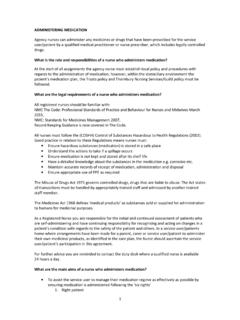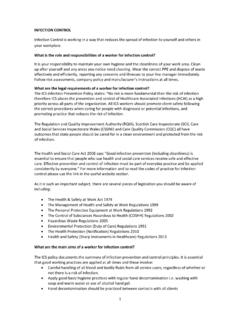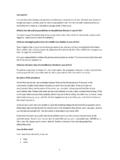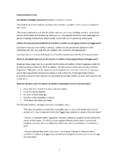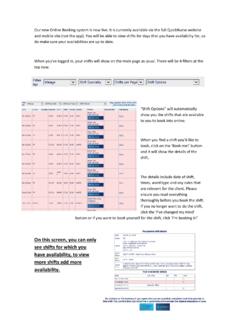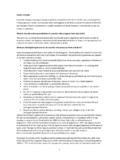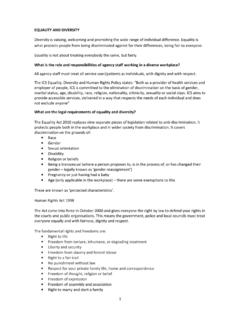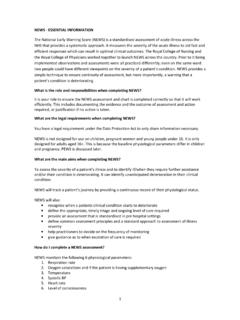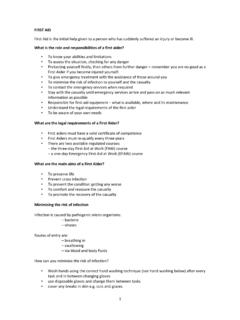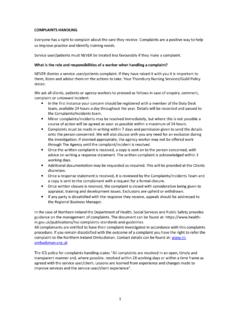Transcription of INFORMATION GOVERNANCE What is the role and ...
1 1 INFORMATION GOVERNANCE INFORMATION GOVERNANCE is the framework of standards for handling INFORMATION in a confidential and secure manner. It guides us on how we deal with service user/patients and employees INFORMATION , especially when that INFORMATION is personal and sensitive. What is the role and responsibilities of an agency worker working with service user/patient INFORMATION ? It is your role to ensure INFORMATION about a service user/patient and/or their condition is only given on a need to know basis. You are guided by the law and Caldicott principles so it is important that you understand these.
2 Never be afraid to question the reason for the INFORMATION to be shared. Duty of Candour Duty of Candour is a professional responsibility to be honest with patients/clients when things go wrong. Section 1 of your ICS policy states: Medical treatment and care is not risk free. Errors will happen and nearly all of these will be due to failures in organisational systems or genuine human errors. The obligations that challenges candour reminds us that for all its continued technological advances, healthcare is a deeply human business.
3 A Statutory Duty of Candour being introduced relates to implementing a key recommendation from the Mid Staffordshire NHS Foundation Trust Public Enquiry (The Francis Enquiry). In responding to the Francis Report, the government supported the proposal to implement a duty of candour with criminal sanctions on providers. The Duty of Candour places a requirement on ICS and other providers of health and social care to be open with patients/clients when things go wrong. The Statutory Duty of Candour is enforceable by law. It is a criminal offence to fail to provide notification of a notifiable safety incident and/or comply with the specific requirements of notification.
4 If ICS are non-compliant to this legislation they could be liable to a potential fine of 2500 per incident. All healthcare professionals have a duty of candour a professional responsibility to be honest with patients/clients when things go wrong. What are the legal requirements of an agency worker working with service user/patient INFORMATION ? The Agency s confidentiality policy states: 1. All INFORMATION that: is or has been acquired by you during, or in the course of your duties, or has otherwise been acquired by you in confidence, relates particularly to our business, our clients and all persons in their care, or that of other persons or bodies with whom we have dealing of any sort, and has not been made public by, or with our authority will be confidential, and (save in the course of our business or as required by the law)
5 You will not at any time, whether before or after work with The Agency, disclose such INFORMATION to any person without our written consent. 2 2. You are to exercise reasonable care to keep safe all documentary or other material containing confidential INFORMATION , and will at the time of ceasing to work for The Agency, or at any other time upon demand, return to us any such material in your possession. 3. You may be provided with personal INFORMATION regarding a patient prior to the commencement of a shift, and in this instance the confidentiality policy must be adhered to.
6 In addition to this you have a legal requirement under the Data Protection Act and the INFORMATION GOVERNANCE Framework to only share INFORMATION necessary. These are explored in more depth later in this module. What are the main aims of an agency worker working with service user/patient INFORMATION ? To keep INFORMATION about service user/patients as confidential as possible Not share INFORMATION unless it is deemed absolutely necessary To understand and follow the Data Protection Act Follow the Caldicott Principles Understand confidentiality INFORMATION GOVERNANCE INFORMATION GOVERNANCE is a framework of best practice, standards and requirements of handling INFORMATION .
7 It has four aims, these are: To support the provision of high quality care by promoting the effective and appropriate use of INFORMATION ; To encourage responsible staff to work closely together, preventing duplication of effort and enabling more efficient use of resources; To develop support arrangements and provide staff with appropriate tools and support to enable them to discharge their responsibilities to consistently high standards; To enable organisations to understand their own performance and manage improvement in a systematic and effective way.
8 Caldicott principles The Caldicott report was completed by Dame Fiona Caldicott, it has reviewed the use of INFORMATION within the NHS. She has identified 7 principles to safeguard INFORMATION . The principles in the Caldicott Report are summarised below: 1. Justify the purpose(s) for using patient data 2. Don't use patient-identifiable INFORMATION unless it is absolutely necessary 3. Use the minimum necessary patient-identifiable INFORMATION 4. Access to patient-identifiable INFORMATION should be on a strict need to know basis 5.
9 Everyone should be aware of their responsibilities to maintain confidentiality 6. Understand and comply with the law, in particular the Data Protection Act 7. The duty to share INFORMATION can be as important as the duty to protect patient confidentiality These principles are not a legal requirement, however, they are seen as essential requirements to support the Data Protection Act. 3 Dame Fiona Caldicott also recommended that each organisation would appoint a Caldicott Guardian, their role is to guide and monitor the organisation on the seven principles and resolve any issues and concerns regarding service user/patient INFORMATION .
10 Protect, Inform, Provide Choice and Improve You should PROTECT a person s INFORMATION by only recording relevant data. This must be accurate, consistent and kept secure and confidential. Keep patient records free of jargon or offensive, opinionated statements. INFORM a patient how their INFORMATION is used and when it may be disclosed. Let them know they have the right to access their own medical records. PROVIDE CHOICE for patients to decide whether their INFORMATION can be disclosed. As long as the patient is competent to make such a choice and where the consequences of the choice have been fully explained, their decision should be respected.
